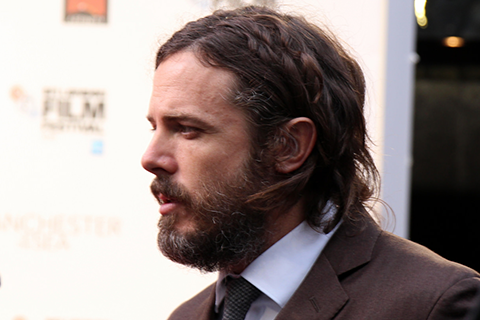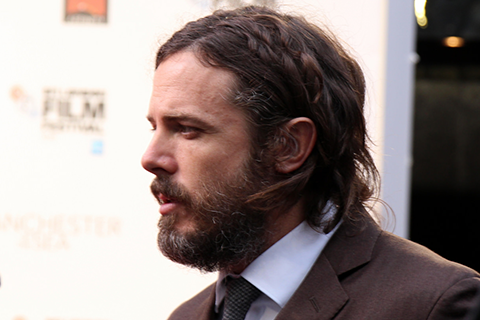Awards Season Reminds Us That Sexism is Anything But Seasonal
thinx archive
·5 min read

by Emma Glassman-Hughes | 01/12/2017
TBH, if Casey Affleck’s minor roles in Oceans Eleven and Good Will Hunting aren't on your list of favorite characters, then you are wrong. The kid had spunk, charm, a bit of a hot head, and surprisingly delightful comedic timing--basically all the ingredients for that classic American good ol’ boy allure. Arguably, however, he was always one element shy of a Hollywood exec’s wet dream: scruffy facial hair wrapped all the way around his head, tied up in a single, greasy bun at the back. Now that he has the hair, Affleck has landed his seat at the table with the big boys. (Warning: gendered term intentional to reflect imbalance of power in industry.)

Image by Bex Walton from London, England (via Wikimedia Commons)
New hair and new film (Manchester by the Sea__, in which he plays an unfriendly and equally unlucky Boston solitary) in tow, Casey Affleck is now favored for many of the awards of the season, including the Golden Globe for Best Performance by an Actor in a Motion Picture, Drama, which he won last weekend. However, there is some rumbling about more than just Mr. Affleck’s mane and movie: he’s the latest in a long list of male celebrities whose history of gendered abuse is making headlines during awards season. In particular, Affleck’s alleged treatment of female coworkers has many in Hollywood squirming, unsure of how to address the issue for an otherwise widely recognizable and beloved actor who is just now finding the spotlight. The details of his behavior have already been laid out by numerous publications, such as this one here.
With the reprisal of Affleck’s alleged harassment on the public conscience, there are disagreements over whether or not his Manchester performance should be lauded--as it has already been--or ignored, in the style of black filmmaker Nate Parker earlier this year. Indeed, Parker’s history with sexual misconduct, though very different and with greater physical consequence, was reason enough in the eyes of the Hollywood elite to all but ice out his Nat Turner biopic, Birth of a Nation, at box offices and awards talks alike. Racial dynamics undoubtedly play a role, as they always do, in determining whose career can float through allegations of misconduct. Beyond that, however, it would appear that tinsel town is using Parker as a shield to bolster its own image as “anti-sexist” while protecting the privileged and favored few in the center, which very much includes Affleck. In ~movie terms~ Parker is their red herring, distracting the Hollywood community and the general public from issues that are much bigger than any individual man.
And speaking of distraction, when it comes to issues of sexual violence and misogyny in the film trade, that’s pretty much all that the awards talk really is--utter distraction.
Is the central issue *really* that Casey Affleck might win an Oscar in spite of being a total prick? That may be an annoying consequence, but it’s not the heart of the problem. I think we can all agree that the problem is the behavior, and how that behavior reflects a culture of male dominance over women. Individual punishment by way of a Hollywood ice-out clearly only harms those without the privilege of being an industry sweetheart (and if we know anything about the racial and gender makeup of the Hollywood elite, the sweethearts are more likely to be white and male. Nate Parker knows this all too well).
Part of what makes it difficult to hold widely beloved men accountable for their actions is that basically the whole point of Hollywood is nostalgia. Familiarity is charming and comforting. However, that nostalgia has the same ability to make beautiful, touching films as it does to make real-life monsters who can evade responsibility because of their power over our collective desire to be comforted. The community at large is incredibly reluctant to cast out anyone or anything that has captured our attention and admiration for any length of time. They grew up with Woody Allen and Bill Cosby; we grew up with the Afflecks. We think we know them, we think they can protect us.
Nate Parker didn’t have the luxury of being part of Hollywood’s security blanket. It makes sense that he’s pretty much the only alleged sexual predator being held accountable by those with power in Hollywood, even in any small way.
Discussing whether or not to withhold industry awards, and even actually following through with it, can’t be the only action taken in an effort to hold men accountable for their abuses. All it does is send the message that sexual harassment and abuse is a “him” thing, and not a “we” thing. It is not going to change the culture of sexism in Hollywood, or anywhere else. The long-term effects are minimal, and it only serves to dredge up more resentment and resistance to change. Instead, we must fundamentally alter our culture of celebrity so that justice and fairness take precedence over romantic ideals of patriarchal nostalgia.
There’s value in questioning what it is that we are really doing each time we argue over which men should be snubbed by the Academy this year for their individually egregious behavior. In doing so, its role as a distraction from real problems is revealed; real problems being that the abuse of women is so culturally internalized and glorified that hurting a woman in any number of emotional or corporeal ways is indeed a status symbol and a sign of material and/or physical triumph, regardless of whether you are a football player, an actor, or the President of the United States. There is no one man to blame for this reality. This is a “we” thing.
The reality is that for women who work hard on and off screen year-round, sexual harassment and micro-aggressions from male coworkers are as routine as the morning coffee. There are so many untold stories of treatment similar to that endured on the set of I’m Still Here--and some of those stories belong to more of our favorite performers and creators, waiting to be exposed by a lawsuit or a news story. If it weren’t Affleck this time, it would have been Gosling, or DiCaprio, or Clooney, or Denzel, or the other Affleck. The problem is so much bigger than individuals, and this whack-a-mole approach of retroaction is not only exhausting, but it’s really not working. While we sit around twiddling our thumbs over whether or not Oscar voters should reward Casey Affleck’s performance, women continue to be harassed and abused and humiliated, and, right or wrong, men continue to feel betrayed, confused, paranoid, and robbed of power. To leave these feelings unchecked is dangerous because this is where toxic masculinity has a tendency to make its ugliest cameo appearances. Instead of addressing these feelings culturally and eventually reconciling them as a group, the feelings of perceived unfairness are festering within individual men, leading only to more violence and more silencing of women. Affleck’s defensive response to media coverage of the allegations of his past is the perfect example.
So, yeah. If Nate Parker is going to be iced out for his allegedly violent past, a past which is admittedly very troubling, then Affleck’s reception should at least be a liiiittle chilly. Instead, the reception has been warm, which to me seems plainly unfair, even if the cases are vastly different. Beyond the isolated examples of these two men, however, Hollywood can do better than its current method of sifting through the pre-accused each awards season and deciding who it will punish and to what degree. Instead, Hollywood can raise a new generation of creators who are courageous and empathetic, who respect boundaries, and who hold one another accountable out of love and admiration. We have the power to keep our interest in tackling sexism from becoming a seasonal thing; we can make it an evergreen kind of commitment.
by Emma Glassman-Hughes


